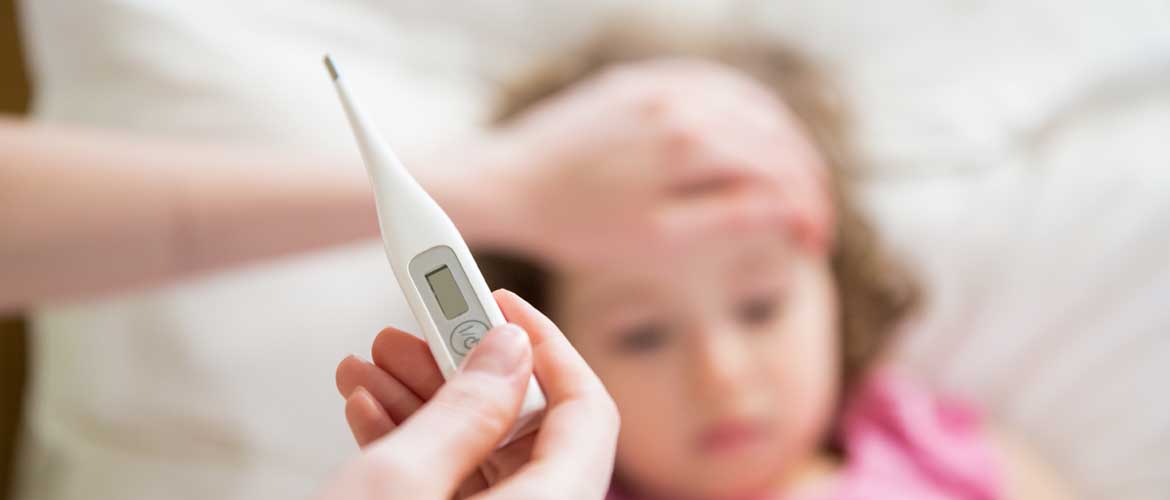September 25, 2017
Sometimes, it’s not as easy to determine as you would think. While certain ailments definitely warrant a day on the couch, others won’t affect your child’s ability to learn or put others at risk. In a recent study by the C.S. Mott Children’s Hospital1, 60 percent of parents are concerned about an illness getting worse if they send their child to school and 47 percent of those surveyed were concerned about their child’s classmates getting sick.
At times, symptoms and signs aren’t always cut and dry, and you need to visit a healthcare professional for a proper diagnosis. However, there are some clear indicators to look for to help you know if your child should stay home.
Here are 3 simple questions that may help you determine.
1. Burning Up?
While a fever isn’t always a sign of serious illness, it is a sign that your body could be fighting a bacterial or viral infection. If your child has a temperature over 100.4 degrees Fahrenheit, they should stay home.
Oftentimes, a child’s internal temperature is lowest when they first wake up. So if your child has an elevated temperature when they first get out of bed in the morning, it may continue to rise during the day. It’s helpful to know what your child’s average body temperature is when they’re not sick, so you can judge if their temperature is normal.
MedExpress Pro Tip: Wait until your child is fever-free without medicine for at least 24 hours before sending them back to school.
2. Able to Learn?

Run down? Nauseous? Taking frequent trips to the bathroom? If you answered yes to any or all of these questions, it’s best to keep your little one home. These symptoms may prevent your child from participating in class or properly learning the material. A day or two of rest can help ensure they’re ready to hit the books when they return.
Things like a runny nose or a mild cough are certainly a nuisance, but armed with tissues and hand sanitizer, your child is okay to attend school. Keep your child home if a runny nose or mild cough is accompanied by lack of appetite, tiredness, or change in mood. These could be signs that something more serious is developing.
MedExpress Pro Tip: Check what children tell you with what you can see. Certain things, like a fever or vomiting, can’t be faked. For ailments like a headache or stomach ache, determine if you think these woes are valid and if they will impact learning.
3. What About Class Contamination?

All it takes is one child to get the whole class sick. And especially in tight classrooms, spreading germs is hard to prevent. An illness can be contagious even before a child starts showing signs. Examples of contagious illnesses that can be spread by close contact are:
- Chickenpox
- Flu
- Pinkeye
- Common Cold
- Strep throat
When it comes to contagious illnesses, children should absolutely stay home. While it’s always best to consult with your doctor before sending your child back to school, typically children are cleared to return to school once they are feeling better and fever-free for 24 hours, without medication. This applies to ailments that include an elevation in body temperature, like the flu.
If your child has been diagnosed with strep throat, they are no longer contagious 24 hours after starting antibiotics. Provided they are feeling well and fever-free, children are fine to head back to class.
For chickenpox or pinkeye, chickenpox needs to be dried and crusted, and children with pinkeye can return 24 hours after starting eye drops or ointment.
Mom (and Dad) Knows Best
Above all, you know your child better than anyone and will need to make a judgment call whether they should head to school or go to the doctor. Does your child frequently try to get out of school or is she striving for perfect attendance and need to be forced to stay home?
If your child misses school, they should take a break from other activities, too. Sports practices, Girl Scouts troop meetings, and other activities should be postponed until your child feels one hundred percent better. Oftentimes, if the activity is school-sponsored, most schools will not allow a child to participate if they were absent that day.
Think that something more serious is on the horizon or need a second opinion? Seek medical attention. And if something pops up before the field trip, or on the weekend before their best friend’s birthday party, MedExpress offers convenient hours, so you don't have to miss out on the fun.
References:
1C.S. Mott Children’s Hospital, Parents struggle with when to keep sick kids home from school

